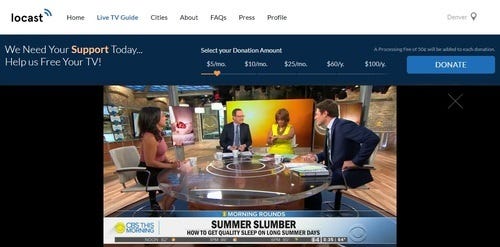Locast, which has filed counterclaims, asserts RCN pulled back a $750,000 donation commitment 'as a result of intimidation from the broadcasters.'

Locast, a startup that provides free streams of local broadcast TV in 13 US cities, did not mince words when it responded to -- and counterclaimed against -- a lawsuit the Big 4 US broadcasters filed, which claims Locast's service violates copyright law by retransmitting signals without authorization.
In a response filed September 26 with a New York District court, Locast called the lawsuit -- which ABC, CBS, NBCU and Fox filed in July -- and broadcasters' claims "objectively baseless and constitute an unlawful sham."
To amplify that sham allegation, the counterclaim argues broadcasters waited many months to file suit against Locast, doing so only after recognizing Locast was gaining momentum. Then, therefore, they became "increasingly upset by their belief" that billions of retrans fees were in jeopardy, the startup wrote.
Figure 1: A Locast Streamed Broadcast The broadcasters filed their lawsuit against Locast in July.
The broadcasters filed their lawsuit against Locast in July.
In Thursday's filing, Locast suit defendants' -- Locast founder David Goodfriend and Sports Fans Coalition NY Inc. (SFCNY) -- reiterated their argument that Locast is a lawful, non-profit entity which provides a public service that also is protected by US copyright laws.
Flipping the script
Locast then tried to turn the tables on the broadcasters and pointed to the ongoing industry contention surrounding what critics call out-of-control retransmission fees. It's broadcasters, Locast argued, who use "copyrights improperly to construct and protect a pay-TV model" that forces consumers to forgo over-the-air programming or to cable providers and other pay-TV providers for programming "intended to be free."
A large portion of fees paid by the pubic goes to broadcasters in the form of retrans consent fees, Locast argued, labeling this practice "classic copyright abuse."
Locast said it carries debt and has yet to achieve operational cash flow break-even, and that Goodfriend is an "unpaid officer and director of SFCNY."
But Goodfriend was a former Dish Network employee more than a decade ago and still serves as a consultant for Dish, which is in a carriage dispute with Fox that, just this week, resulted in a blackout, Locast conceded. "[Locast has] received no financial support whatsoever from Dish," it added.
Even as a non-profit, Locast needs funds to stay afloat, referencing that AT&T donated $500,000 in July 2019; Locast also received an "arm's length loan" from IoT Broadband (the amount of that IoT Broadband loan was $800,000, according to the Wall Street Journal). Locast, which has appealed to viewers to contribute money toward its legal defense, also encourages -- but doesn't require -- consumers to pay a monthly donation to Locast.
Claims of broadcaster intimidation
Locast said it has sought donations from other parties, but the broadcaster lawsuit gave some prospects cold feet. It met with RCN in January 2019 and the cable operator committed a $750,000 donation to SFCNY, the filing said.
RCN was interested in Locast as it looked into a strategy to apply more focus on providing broadband Internet; the operator made the donation commitment under the assumption SFCNY could find other donors. After SFCNY identified another donor to pledge first, RCN said it would no longer be willing to donate.
"[RCN] changed plans as a result of intimidation from the broadcasters," Locast wrote.
Goodfriend met with T-Mobile executive in Denver in December 2018, the filing said. That unnamed exec informed Goodfriend that broadcast industry reps told a group gathering that "they would crush Locast" and "take on" any of Locast's supporters, the document said.
Locast also claimed that a senior exec at Mediacom Communications told Goodfriend during a meeting last October in New York that a broadcast owner and another broadcast network implied they were waiting on Locast to get bigger and then sue Locast and its supporters.
At a meeting of SFCNY and senior YouTube TV execs in April 2019, YouTube execs indicated they were told the broadcasters would punish them when negotiating carriage deals for other non-broadcast programming deals if YouTube TV provided access to Locast, the filing noted.
In the original suit filed against Goodfriend and SFCNY the broadcasters referred to Locast as "simply Aereo 2.0, a business built on illegally using broadcaster content," and a reference to a paid service that was sued out of existence a few years ago. "Locast's founding, funding and operations reveal its decidedly commercial purposes," the broadcasters claim.
Related posts:
— Jeff Baumgartner, Senior Editor, Light Reading
About the Author(s)
You May Also Like











